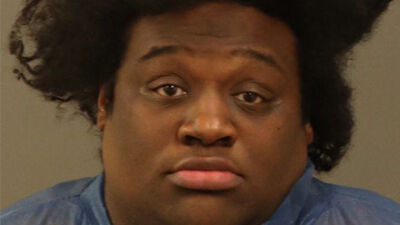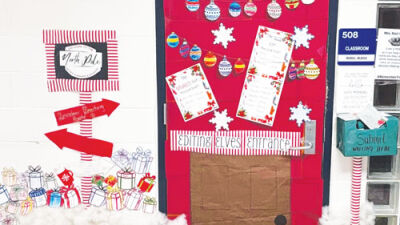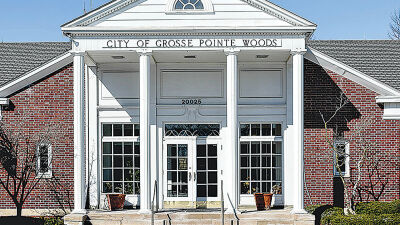
When visiting the Zekelman Holocaust Center June 7, a group of Warren Woods Tower High School 10th graders heard the story of Holocaust survivor Ben Kawer, pictured.
Photo provided by Lynn Wolf
FARMINGTON HILLS/WARREN — On June 7, before the 2021-2022 school year ended, several Warren Woods Tower High School students visited the Zekelman Holocaust Center.
The 55,000-square foot memorial center, located at 28123 Orchard Lake Road in Farmington Hills, is packed with photographs, displays, text panels, video testimonies, sculptures and more that outline the death and devastation of the Holocaust.
The pictures are disturbing; the stories are heartbreaking. Hearing the grim details of how people were brought to the death camps and forced to work while living in dismal conditions was part of the tour.
Earlier in the school year, students in teachers Kimberly Smith and Kristi Thielk’s 10th grade English classes read the book “Night,” by Elie Wiesel. The autobiographical book tells the story of Wiesel’s survival as a teenager in Nazi death camps.
“We felt this was a fantastic follow-up,” Thielk said of the field trip. “After reading ‘Night’ the children could see some of the things they read about. Elie Wiesel is a survivor. He’s 15 when he first goes to Auschwitz. He’s their age.”
“There’s a state of Michigan requirement that you have to do a Holocaust unit,” Smith said. “I think this makes it more real for them. You can read about it in a book, but it is another thing to see photographic evidence.”
World War II lasted in Europe from 1939 to 1945, but the persecution of Jewish citizens began in 1933. Many non-Jewish people also died during the Holocaust, due to their religion, sexual orientation, politics, ethnicity or because they were disabled.
The Zekelman Memorial Center’s core exhibits are “The Eternal Flame and Memorial Wall,” “The Museum of European Jewish Heritage,” “Descent into Nazism,” “The Postwar Period” and “The Camp System.”
After the tour, the students, Smith and Thielk settled into a conference room to hear a presentation from Faye Wolf, who shared the story of her father and Holocaust survivor Ben Kawer, who lived from 1925 to 2012.
‘You two take care of each other’
Kawer was born in Ostrolenka, Poland, to Hersh Leib Kawer and Dina Kawer. He had one brother, Lazer, and two sisters, Rachel and Esther. He was the youngest child.
“My dad did not talk about the Holocaust at all until he was well into his 70s,” Wolf, of West Bloomfield, said. “It was something he kept inside of him.”
As a young child, Kawer experienced antisemitism.
“People would call him a dirty Jew,” Wolf said. “He would get beatings every single day at school. He was not the only Jew in the school. It was accepted that you could do this to people.”
Following the German invasion of the Soviet Union in June 1941, Kawer’s hometown fell under Nazi control. Two months later, the Jewish people, including the Kawer family, were rounded up and marched to a ghetto established in Pruzhany, Poland. The family also included Rachel’s husband and two children, and Lazer’s wife and two children, with a third on the way.
In early 1943, the Pruzhany ghetto was dissolved, and the prisoners were brought in cattle cars to the Auschwitz camp in Poland. Kawer and his brother were selected for labor and separated from the rest of the family.
“The last vision he has of his mother was seeing her being driven away in a truck. She was holding one of Rachel’s kids,” Wolf said. “He had no idea that was the last time he was going to see her.”
Kawer always remembered the last words his dad spoke to him and his brother.
“You two take care of each other,” Wolf said. “That was a promise the two made for the rest of their lives.”
Kawer never saw his father again.
Over the next two years, Kawer and Lazer were forced into hard labor, including construction work. They survived on very little food and were surrounded by death as the war raged. They also moved to different camps and subcamps, including Buchwald, Birkenau, Buna and Langenstein-Zwieberge. At Birkenau, Kawer and Lazer’s heads were shaved. The number 98910 was tattooed on Kawer’s arm, and 98909 on Lazer’s arm. The pair continued to work in slave labor, but Kawer still counted his blessings, according to Wolf, such as when he saw a beautiful sunrise over Auschwitz.
Sadly, the entire Kawer family was killed while in the death camps with the exception of Lazer. When the war ended in 1945, the pair relocated to Belgium where they reunited with a friend they met in a labor camp.
“He had nowhere else to go,” Wolf said. “My dad never wanted to go back to Poland. There were no family or friends.”
‘It was so painful to him’
Kawer eventually made his way to the U.S., settling in Detroit while his brother relocated to Costa Rica. Kawer went to college, married and had three children, and established an insurance business.
Lazer remarried and had more children. According to Wolf, Lazer never talked about his first wife and their children.
“It was so painful to him,” Wolf said.
Somehow, Kawer was convinced Esther was still alive.
“He bought her a watch that he carried with him for the rest of his life in hopes he would see her again,” Wolf said.
While growing up, Wolf remembers her dad often had nightmares and was very protective of her, her sister and brother. To this day, the aftermath of the Holocaust remains. For instance, a few months ago, Wolf came across a black-and-white photo from the 1930s.
“I had never seen it before,” she said. Although she recognized her dad in the picture, “I became very sad because I did not know all the people in the photo.”
As an adult, Wolf said her dad wasn’t all that interested in traveling abroad.
“He felt the U.S. was the greatest country in the world because they truly understand what freedom is,” Wolf said.
He eventually began sharing his Holocaust survivor story at the museum with the school groups who came through. When Wolf asked her dad why he decided to go back after his first presentation he told her, “I tried it. The kids were listening. That’s what made me go back.”
“He truly felt you are the future and you are the ones that can stop this from happening again,” Wolf told the Warren Woods Tower High School students. “I hope my dad’s story was meaningful to you.”
For more information about the Zekelman Holocaust Center, call (248) 553-2400 or visit holocaustcenter.org.
 Publication select ▼
Publication select ▼





















